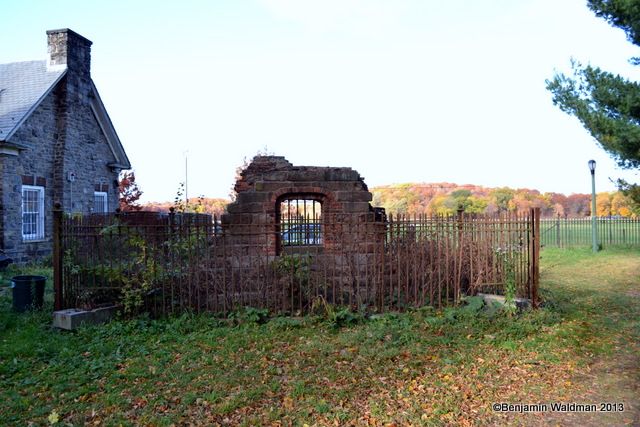NYC’s Forgotten ‘War on Christmas Trees’
Discover how an obscure holiday crackdown affects festive street vendors today!


Every day, New Yorkers pass by a relic of the Revolutionary War without giving it a second glance. On Duane Street, embedded into the wall of the NYPD Headquarters is (supposedly) a prison window dating back to 1763. The window is purported to be a vestige of the haunted Rhinelander (originally Cuyler) Sugar House prison used during the British occupation of New York from 1776 to 1783. There is some controversy over this widely accepted story though. In his book Forgotten Patriots, Brooklyn College professor Edwin G. Burrows found evidence that Cuyler, the owner of the refinery, “was a Tory, and his refinery appears to have continued to operate during the occupation.” If Burrows is correct, the plaque here joins the long list of incorrect historical plaques in New York City.
Regardless, the memorial stands testament to the prisoner brutality suffered by American revolutionaries at the hands of the British during the war. The more infamous Livingston’s sugar house on Liberty Street housed up to 500 prisoners, according to this harrowing first-person account by Levi Howard, printed in The New York Times in 1852. More than twice the number of deaths occurred in sugar houses and prison ships than on the battlefield during the American Revolution.
Grant Thorburn, a Scottish immigrant, lamented upon the demolition of the Liberty Street Sugar House in 1840 that “it is probable that in the year two thousand and twenty-one there will not be found a man in New-York who can point out the site whereon stood a prison whose history is so feelingly connected with our revolutionary traditions.” [from Forgotten Patriots]
After the war, the Rhinelader Sugar House fell into disrepair and people generally believed it to be haunted. The Rhinelander Building replaced the sugar house in 1892, until it was demolished in 1968 to become what is now the NYPD headquarters site. The window was left intact both times for preservation, offering New Yorkers a remnant of the Revolutionary War. Interestingly, another window from the Rhinelander Sugar House was relocated to Van Cortlandt Park where it currently stands as a memorial, while the columns of the Rhinelander Building stand in a public area on Madison Street.

Have a quirky find you want us to publish? Let us know at contact[at]untappedcities.com!
Subscribe to our newsletter